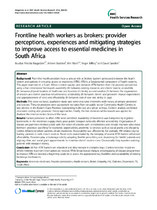Frontline health workers as brokers: provider perceptions, experiences and mitigating strategies to improve access to essential medicines in South Africa
Date
2014Author
Magadzire, Bvudzai Priscilla
Budden, Ashwin
Ward, Kim
Jeffery, Roger
Sanders, David
Metadata
Show full item recordAbstract
Background: Front-line health providers have a unique role as brokers (patient advocates) between the health
system and patients in ensuring access to medicines (ATM). ATM is a fundamental component of health systems.
This paper examines in a South African context supply- and demand- ATM barriers from the provider perspective
using a five dimensional framework: availability (fit between existing resources and clients’ needs); accessibility
(fit between physical location of healthcare and location of clients); accommodation (fit between the organisation
of services and clients’ practical circumstances); acceptability (fit between clients’ and providers’ mutual expectations
and appropriateness of care) and affordability (fit between cost of care and ability to pay).
Methods: This cross-sectional, qualitative study uses semi-structured interviews with nurses, pharmacy personnel
and doctors. Thirty-six providers were purposively recruited from six public sector Community Health Centres in
two districts in the Eastern Cape Province representing both rural and urban settings. Content analysis combined
structured coding and grounded theory approaches. Finally, the five dimensional framework was applied to
illustrate the interconnected facets of the issue.
Results: Factors perceived to affect ATM were identified. Availability of medicines was hampered by logistical
bottlenecks in the medicines supply chain; poor public transport networks affected accessibility. Organization of
disease programmes meshed poorly with the needs of patients with comorbidities and circular migrants who move
between provinces searching for economic opportunities, proximity to services such as social grants and shopping
centres influenced where patients obtain medicines. Acceptability was affected by, for example, HIV related stigma
leading patients to seek distant services. Travel costs exacerbated by the interplay of several ATM barriers influenced
affordability. Providers play a brokerage role by adopting flexible prescribing and dispensing for ‘stable’ patients and
aligning clinic and social grant appointments to minimise clients’ routine costs. Occasionally they reported assisting
patients with transport money.
Conclusion: All five ATM barriers are important and they interact in complex ways. Context-sensitive responses
which minimise treatment interruption are needed. While broad-based changes encompassing all disease programmes
to improve ATM are needed, a beginning could be to assess the appropriateness, feasibility and sustainability of existing
brokerage mechanisms.

